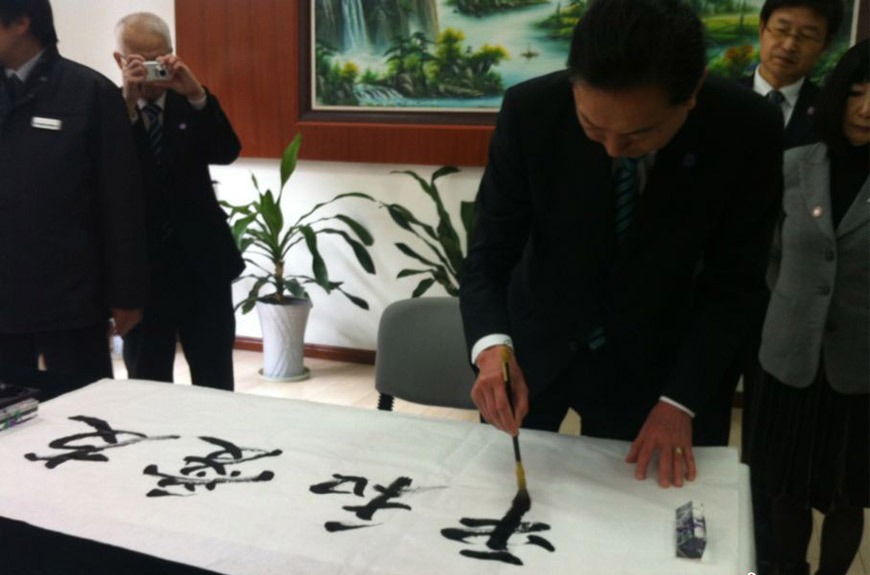Acknowledging Nanjing Massacre a step toward ‘peace and friendship’, say experts

Yukio Hatoyama writing the scroll bearing “friendship and peace”
(Chinanews)
Former Japanese Prime Minister Yukio Hatoyama visited the The Memorial Hall for Compatriots Killed in the Nanjing Massacre by Japanese Forces of Aggression in Nanjing on January 17. Hatoyama apologized for the crimes committed by the Japanese army during the Second Sino-Japanese War. Experts say this indicates that there is no shortage of Japanese calling for peace and progress and willing to acknowledge the Japanese invasion of China during the Second World War.
Yukio Hatoyama commemorated his visit with a scroll bearing the characters “friendship and peace” in his own calligraphy. Zhang Xianwen, director of the Center for History of Republican China of Nanjing University, said “We felt relieved to see there is a politician as sober and rational as Hatoyama in Japan.”
Han Dongyu, dean of School of History and Culture at Northeast Normal University, said that the current and former Prime Ministers’ actions are very divergent, pointing outcurrent Prime Minister Shinzō Abe’s attempt to isolate China with the so-called “value diplomacy” during his visit to ASEAN countries, which overlapped with Hatoyama’s visit to Nanjing. The seemingly opposite behaviors are indicative of the confusion of and complicated feelings toward China among Japan’s citizenry. Han added that “no more warfare between China and Japan” has been the bottom line since the two countries normalized relations in 1972. This wish was not just the choice of statesmen, also the sincere wish of the people of both nations, Han elaborated. We must alleviate the hatred and go beyond the emotional barrier caused by the war.
During his visit to the memorial, Hatoyama asked the curator, Zhu Chengshan, questions about the total wartime population of Nanjing and the number of victims, as well as details of Nanjing War Crimes Tribunals. “Drawing lessons from history can help prepare us for the needs of the future. Putting aside our differences, and strengthening communication and cooperation is the key to solving conflicts in China and Japan relations. Only through respect and recognition of historical facts, as well as strategic bilateral dialogue on old and new problems, will we be able achieve genuine peace and friendship,” said Zhang Yong, secretary-general of the Sino-Japanese Relations Research Center in the Institute of Japanese Studies at the Chinese Academy of Social Sciences.
Zhang observed “Compared with the initial stage of the normalization of China and Japan relations, there have been new developments and bilateral relations have become increasingly complicated; China and Japan relations are currently undergoing a new transformation, while domestic actors that influence foreign policy decision-making organs within the two countries are experiencing adjustments in their sense of national strength, psychology, strategy and policy that compound the complexity of this transformation.” In terms of national strength, the burst of the bubble economy of Japan is in obvious contrast with the rapid rise of China, and this change of footing will inevitably require the gradual adjustment of policy-makers and citizens’ national self-conception in both countries. In addition, both sides are faced with strategic adjustments and policy formulation toward each other. Such conflict in values and interests, according to Zhang, will repeatedly complicate bilateral relations, and therefore positive interaction between the two will rely on whether they can effectively seek common ground while reserving differences.
Both Chinese and international scholarship have done research to reveal the historical facts of the Nanjing Massacre. Jiang Liangqin, an associate professor at the Center for History of Republican China of Nanjing University, said “What Hatoyama has done has not only helped us better understand the complicated social environment in Japan, but also strengthened our confidence in researching the Nanjing Massacre.”
“Whoever ties the bell around the tiger's neck must untie it”, Zhang Yong asserted, adding that whether the ice could be broken again in China and Japan relations will firstly be determined by the sincerity and political judgment of policy-makers in Japan, and how their sentiments are put into practice. Song Zhiyong, dean of Institute of Japan Studies at Nankai University, expressed his hope that the ruling party in Japan could listen to the clamor for peace and progress in both countries, and work to improve bilateral relations and take the road of peaceful development.
Hatoyama was the third former Japanese Prime Minister to visit the memorial after his predecessors Tomiichi Murayama and Toshiki Kaifu, who visited the memorial in 1998 and 2000 respectively.
Wu Nan is a reporter from Chinese Social Sciences Today.
The Chinese version appeared in Chinese Social Sciences Today, No. 407, Jan 21.
For Chinese reference:
http://www.csstoday.net/Item/44579.aspx
Translated by Jiang Hong
